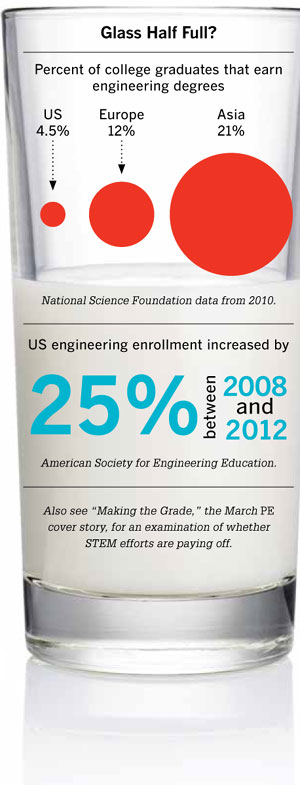May 2014
COMMUNITIES: EDUCATION
Project-Based Learning: The Key to More Female Engineers?
BY RICHARD VAZ
 Although the number of students enrolling in engineering programs has increased in recent years, the US still has work to do in broadening the profession’s appeal. A much smaller percentage of college students in the country earn engineering degrees than in Europe and Asia. Recruitment and retention is particularly critical among women, who comprise only 19% of the nation’s engineering graduates.
Although the number of students enrolling in engineering programs has increased in recent years, the US still has work to do in broadening the profession’s appeal. A much smaller percentage of college students in the country earn engineering degrees than in Europe and Asia. Recruitment and retention is particularly critical among women, who comprise only 19% of the nation’s engineering graduates.
Why the lack of progress? Many engineering curricula are still built around isolated courses in math, science, and analysis that haven’t changed much since the professors were students themselves. While accreditation pressures have led schools to reintroduce design and increase attention on teamwork and professional skills, change remains incremental rather than fundamental.
Engineering education must do a better job of attracting and retaining talented students and preparing them to be collaborative leaders and innovative problem solvers. A recent study suggests that project-based education can contribute in exactly those ways. In addition, the findings indicate that this type of curriculum is especially effective and empowering for women.
More than 2,500 alumni of Worcester Polytechnic Institute, representing 38 years of graduates, participated in an externally conducted study about the impacts of open-ended project work on graduates’ careers and lives.
WPI’s curriculum features collaborative projects in and out of the classroom, and in and out of the major. The study explored the outcomes of two significant projects required of all students.
In both, small teams tackle problems under faculty guidance, typically for external sponsors. Third-year interdisciplinary research projects involve social problems and human needs. More than half take place off campus, either locally or around the globe, with students working with sponsoring organizations. Fourth-year projects focus on capstone design or research and are often completed in partnership with industrial sponsors or research laboratories. Both projects emphasize critical thinking, communication, teamwork, and results that address an authentic problem.
For the study, alumni were asked to judge the projects’ professional benefits, worldview effects, and personal impacts postgraduation.
Participants attributed many professional benefits to these project experiences, citing gains in problem solving, project management, leadership, teamwork, and communication skills. Alumni also reported that project work led to deeper understanding of the relationships between technology and society. In addition, they reported numerous personal benefits from the projects, such as a greater sense of self-efficacy and character development.
Strikingly, women reported greater gains than men in 36 of 39 areas. For instance, 66% of female participants were strongly positive (responding “much” or “very much”) about the extent to which the project work prepared them to be effective leaders, compared to 54% of men. Similarly, 78% of women reported that the experiences helped them effectively manage projects, compared with 66% of men. Significant differences also appeared in other professional arenas such as communication, teamwork, problem solving, independent learning, and professional advancement.
Gender differences were even more pronounced in the impacts on personal lives and world views. Seventy-six percent of female engineering graduates reported their project work helped them develop a “stronger personal character,” compared with 65% of men. Sixty-seven percent of women reported that the projects helped them view issues from different perspectives, compared with 55% of men. Women also reported stronger positive impacts in appreciation for other cultures and the belief that they could “make a difference.”
In interviews exploring these findings, alumnae described project work as highly motivational. One said, “These projects are a great way to apply what students learn in the classroom in a way that positively impacts society.” She then added, “I think women especially connect with that societal aspect of these projects, and that helps enhance their engineering education.” The alumna went on to say that before her project work, “I wasn’t interested in engineering because I didn’t see the societal component to it…. I used to think it was just men behind desks doing calculations…. Engineering can be much more rewarding than just that, and these projects, I think, helped me to recognize that.”
Another alumna highlighted project collaboration, saying that off-campus work “allowed us to build more intimate connections with people” and indicating that she hadn’t been able to create such connections on campus. Another said that “[b]eing part of a team was a wonderful experience.” A male interviewee noted that project work requires a lot of communication and offered that “[w]omen generally value communication processes more than men do.”
 These findings are consistent with research on gender differences and engineering teamwork. Studies suggest that women are more oriented toward the context of engineering problems than men, and women learners perceive engineering problems with a broader scope. Researchers have also concluded that women are more highly motivated than men by collaborative work and by social impacts. Team-based, authentic project work aligns favorably with these motivations and orientations, so it makes sense that women might engage more enthusiastically with it, leading to greater learning gains.
These findings are consistent with research on gender differences and engineering teamwork. Studies suggest that women are more oriented toward the context of engineering problems than men, and women learners perceive engineering problems with a broader scope. Researchers have also concluded that women are more highly motivated than men by collaborative work and by social impacts. Team-based, authentic project work aligns favorably with these motivations and orientations, so it makes sense that women might engage more enthusiastically with it, leading to greater learning gains.
WPI didn’t adopt its project-based curriculum to appeal to women, but rather to prepare all students for meaningful careers and lives. The alumni study and other measures confirm the projects are doing just that. The university has a 97% retention rate from first to second year, and is regularly ranked among the top 20 institutions nationally for return on investment by Payscale, a salary and benefits information company.
Universities are increasingly engaging engineering students in authentic project work. Harvey Mudd College is well known for its Clinic Program, as is Penn State for its Learning Factory. Olin College also features project work prominently. Engineering Projects in Community Service (EPICS) involves students both at Purdue and elsewhere. And Villanova’s recent adoption of a project-based first year has increased both enrollment and retention of women.
If authentic project experiences can become the norm—experienced by all students across the curriculum—they can have a national impact on the engineering talent pipeline. These effects may be particularly powerful for women.
There is no shortage of authentic and compelling problems for engineering students to tackle; every community and organization faces challenges. The task for engineering education is to put authentic project work at the heart of the curriculum, rather than at its periphery.
Richard Vaz is an associate professor in WPI’s electrical and computer engineering department and the school’s dean of interdisciplinary and global studies.


 Volunteering at NSPE is a great opportunity to grow your professional network and connect with other leaders in the field.
Volunteering at NSPE is a great opportunity to grow your professional network and connect with other leaders in the field. The National Society of Professional Engineers (NSPE) encourages you to explore the resources to cast your vote on election day:
The National Society of Professional Engineers (NSPE) encourages you to explore the resources to cast your vote on election day:



